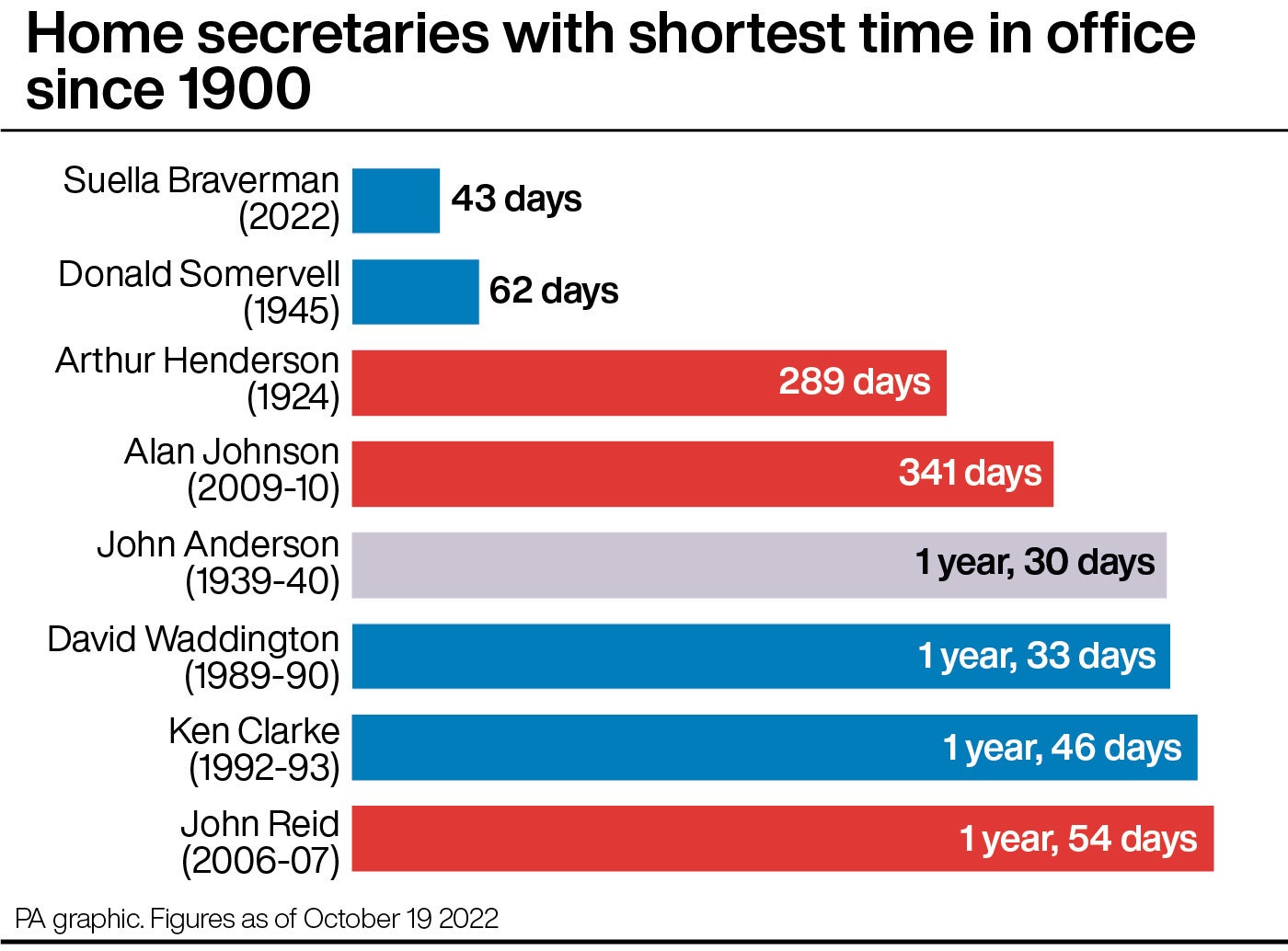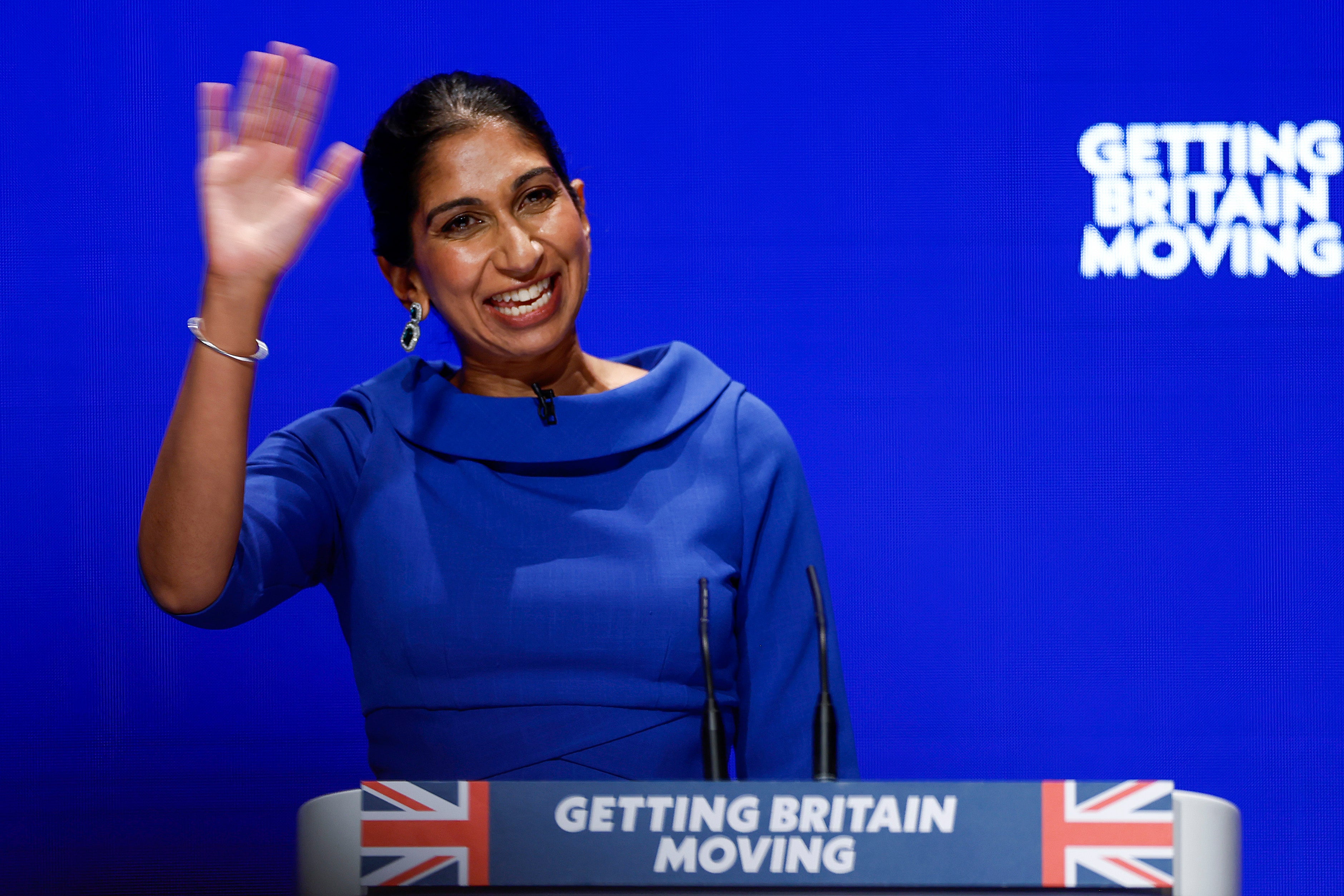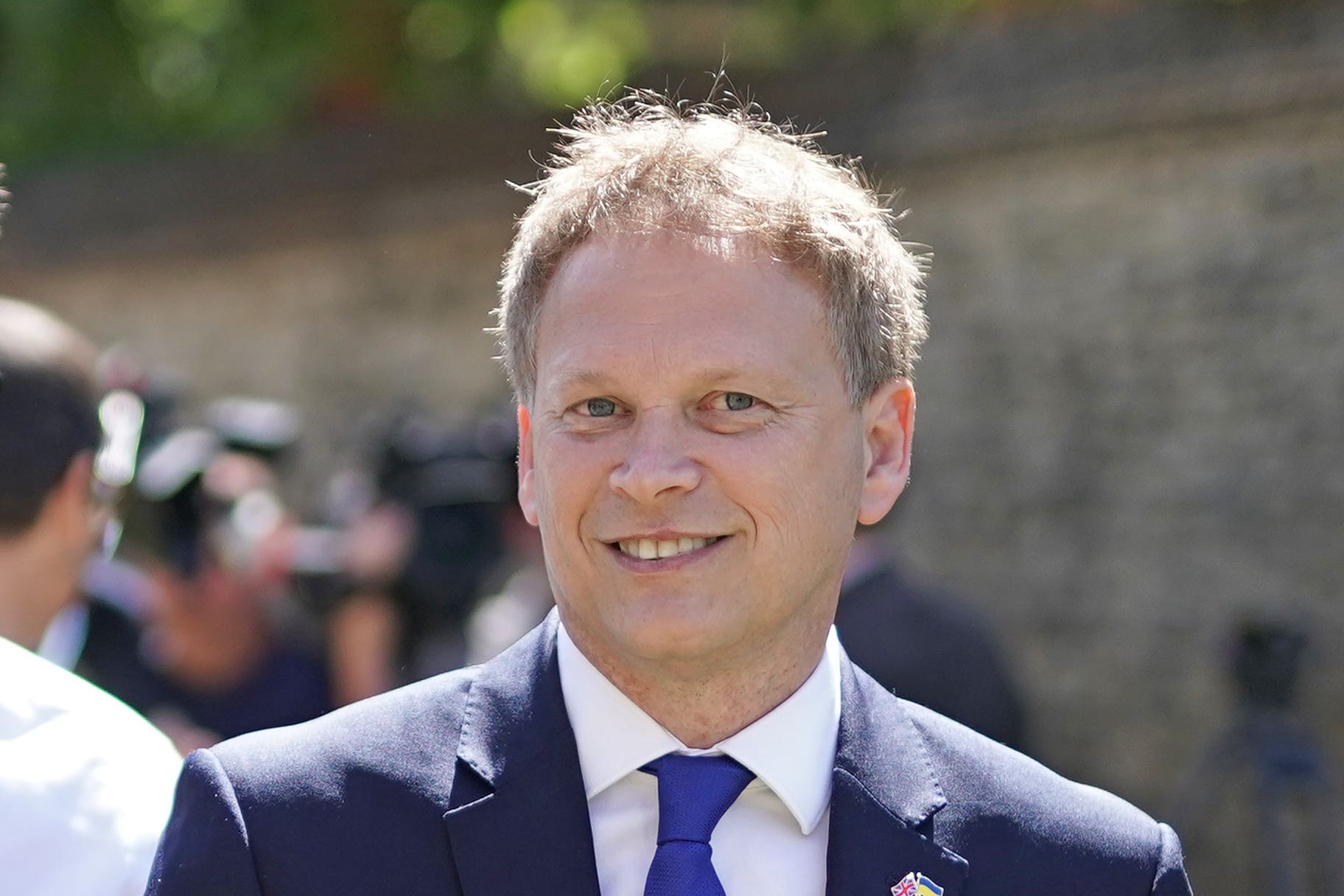‘Initial reaction was what the f***?’: Suella Braverman resignation plunges Home Office into fresh chaos
Staff had barely started work on departing home secretary’s controversial agenda for asylum, immigration and policing
The Home Office has been plunged into fresh chaos by Suella Braverman’s departure, as it fights battles over asylum, immigration and policing.
Ms Braverman’s resignation was reported in the media before being communicated to staff, who had barely started work on implementing her agenda after she took on the role less than two months ago.
A source said Home Office civil servants had no inkling of her departure, adding: “The initial reaction was what the f***?”
“The thing that struck us about her is that she talked a lot but didn’t deliver on anything,” he told The Independent.
“Stability is what staff want, it would be quite nice to have someone quite boring who’s not briefing to the press every five minutes.”
The appointment of Grant Shapps as the new home secretary was greeted with cautious optimism among civil servants, who viewed him as a stable transport secretary who supported them under pressure.
Shortly after his role was announced, he told journalists: “There is a very important job to do. People expect their government to ensure there is security for them. The Home Office is at the heart of that in so many different ways.
“It is a great office of state. I am obviously honoured to do that role. I am going to get on with that serious role right now.”
In her resignation letter, Ms Braverman said she was stepping down after breaching the ministerial code by sending a draft written ministerial statement on migration – which was due to be delivered on Thursday – to another MP from her personal email.
After becoming the shortest serving home secretary in modern times – in office for just six weeks – she said it had been a “great honour to serve at the Home Office”.

“The British people deserve policing they can respect, an immigration policy they want and voted for in such unambiguous numbers at the last election, and laws which serve the public good, and not in the interests of selfish protesters,” she added. “I wish my successor good luck.”
The Home Office source said Ms Braverman’s email constituted two conventions of the ministerial code – by sharing a statement ahead of time and from a personal account – but could not be formally investigated because no ethics adviser is in place, following resignations under Boris Johnson’s leadership.
“The recent trend has been to hold on as long as possible,” he added. “They are breaches of the code but one does wonder what standards are being applied there.”

Priti Patel was previously kept in her post after breaching the ministerial code by bullying staff, while the former prime minister refused to resign after breaking Covid laws – being backed by Ms Braverman during her time as attorney general.
The shadow home secretary, Yvette Cooper, said the government was “falling apart at the seams” after the recent sacking of former chancellor Kwasi Kwarteng.
“Home affairs, security and public safety are too important for this kind of chaos,” she added.
“The problems go beyond one home secretary. If the Conservatives can’t even manage the basics they need to get out of the way and hand over to people who can.”

Ms Braverman had triggered discussions between the Home Office, Downing Street and government lawyers aiming to alter the operation of human rights and modern slavery laws in relation to asylum claims.
She had vowed to pursue the floundering Rwanda deal, saying that seeing a flight take off was her “dream” and “obsession”, despite ongoing legal challenges and mounting costs.
Internal rows with Downing Street over her calls for cuts to net migration and student visas were splashed across the newspapers, while open criticism of Indian migrants endangered a major trade deal with Delhi.
Ms Braverman also sparked an early rift with police officers by accusing them of “pandering to identity politics” rather than “catching the bad guys”, and ordering them to cut crimes including murder by 20 per cent – without saying how the reduction would be implemented or measured.
The government was accused of fuelling rocketing transgender hate crime after the home secretary waded into rows on Twitter and declared at the Conservative Party conference that “a woman has two X chromosomes, a woman gives birth, a woman does not have a penis”.

On her first day in office last month, Ms Braverman had told Home Office staff that driving down violent crime was one of her key aims.
A source who saw the speech told The Independent that she named other priorities as stopping migrants crossing the English Channel in small boats and achieving Boris Johnson’s programme to recruit 20,000 extra police officers by March.
The pledge looks set to fail, while recorded crime is at a record high and prosecutions stand at a record low, and Channel crossings have shown no sign of slowing.
Ms Braverman made no progress in tackling a significant mountain of issues left by Priti Patel, while the recent economic crisis has caused fresh discord in the Home Office over the need for migrants to fill labour shortages.
She resigned a day after sparking incredulous laughter in the House of Commons after attacking “the coalition of chaos, TheGuardian-reading, tofu-eating wokerati” while backing a package of draconian protest laws.
The Public Order Bill has been narrowly passed by MPs but is likely to be opposed by the House of Lords, who threw out the same proposals – including the suspicionless stop and search of peaceful protesters – when the government attempted them in a previous act.
The Independent understands that many of the new powers are not widely supported by police, while the Home Office itself admitted that proposed banning orders “essentially takes away a person’s right to protest and … would very likely lead to a legal challenge”.

Four High Court cases linked to the Rwanda deal are currently underway, with no flights yet scheduled to take asylum seekers to the country.
As well as a £120m up-front payment for “the economic development and growth of Rwanda”, the government has admitted paying a further £20m for “initial set up costs” and has refused to disclose how much it will pay for every person sent.
It is already paying a huge amount of money to house asylum seekers in hotels in the UK, after failing to set up official accommodation for the predicted rise in Channel crossings.
A watchdog report published on Wednesday showed the Home Office internally admitting that its current practice of housing unaccompanied children in asylum hotels is illegal.
Last week, High Court judges castigated the department for breaching its “duty of candour” by denying the existence of a policy to seize all Channel migrants’ phones, which it later admitted was in operation and unlawful.
While battling to control the chaotic policy implementation, the Home Office is also wary of any potential cuts to civil servants or linked public services as part of fresh government austerity.
Join our commenting forum
Join thought-provoking conversations, follow other Independent readers and see their replies
Comments




Bookmark popover
Removed from bookmarks